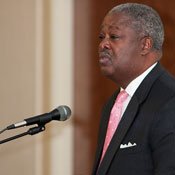Three 19-acre lagoons at the Savanna Street Waste Water Treatment Plant have been filling up with sludge for years. But changes to state environmental regulations are forcing the city to finally purge the semi-solid gunk from the treatment facility.
In other words, the city of Jackson is finally getting its crap together. At the May 29 city council meeting, with Ward 3 Councilwoman Larita Cooper-Stokes as the lone dissenting vote, the council approved a $9 million contract with Russellville, Ark.-based Terra Renewal Services to remove the sludge now stored in three lagoons at the treatment plant.
Terra will be in charge of removing the sludge—which consists of human waste and other semi-sold materials—from the lagoons, which city officials said, without being too specific, has built up over the course of years.
Dan Gaillet, the city's public works director, said the total amount of sludge that needs to be pumped out of the lagoons totals 57 acres. By comparison, the average American football field is 1.32 acres.
The sludge will then be placed in large permeable tubes that resemble enormous sandbags, dried and then disposed. Mayor Harvey Johnson Jr. Said it should take about two years to get rid of all the sludge. He named three different consulting firms to oversee the work: Jackson-based Southern Consultants Inc., Crown Engineering PLLC and Cambridge, Mass.-based CDM Smith.
Until now, state requirements allowed the city to let the sludge back up, but new regulations require the city to remove the sludge, Gaillet said. The city has until April 2014 to de-sludge the water-treatment lagoons and until 2017 to haul the sludge away, Gaillet added.
Johnson noted that some states, such as Kentucky, allow entities to sell the sludge as fertilizer, but Mississippi law prohibits the process. Ward 7 Councilwoman Margaret Barrett-Simon suggested that the sludge sales could represent a potential revenue stream. However, the practice of using sludge as fertilizer has been controversial, drawing criticism from environmental watchdog groups.
This week, the council also approved an $80,000 contract with Project Management Consultants to oversee several projects, including maintenance of the Charles Tillman Bridge, facade repairs at City Hall and repairs at several fire stations around the city.
Council President Frank Bluntson asked if anyone already on the city's payroll could oversee the project instead of paying a consultant. Johnson responded that city employees are tied up with other things and didn't have time to give the projects their full time and attention. He added that such project-management consultant agreements are routine and rarely raise questions.
Cooper-Stokes chastised Bluntson, who has declared his intention to seek the mayor's seat in next year's municipal election, for using the council president's seat as a soapbox and urged the council to move on to other business.
"I ask that you not sit there and run for mayor" from the president's chair, Cooper-Stokes said.



Comments
Use the comment form below to begin a discussion about this content.